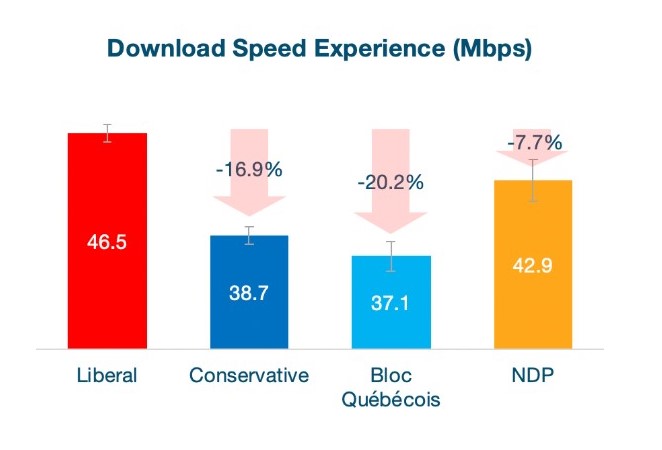
MOBILE ANALYTICS COMPANY Opensignal this week cross-referenced Canadian mobile service speeds and data throughput with our electoral results and found trends which are perhaps not so surprising.
The company found its users, on average, have a better mobile experience in the ridings/districts where the Liberal Party won its seats. Considering the Liberals won a large number of urban seats, and the Conservatives will send a great many rural MPs to Ottawa, it’s unlikely this will come as a surprise, since wireless performance tends to be slower outside of urban regions.
However, while it’s slower in the counties, it’s not as though Conservative-voting ridings have to put up with snail’s pace speeds.
Opensignal users’ 4G availability and video experience varied by less than 10% across the ridings where the four major political won their seats. However, the company measured a marked difference in both speed metrics.
“Our users in the Conservative and Bloc Québécois districts had a 16.9% and 20.2% lower download speed experience than our users in the Liberal ridings (but still more than 37 Mbps), though the gap was even wider in upload speed experience, where they saw on average 7.6 Mbps and 8.8 Mbps upload speeds — 30.2% and 19.2% lower than the 10.9 Mbps our users on average enjoyed in the Liberal districts,” reads the Opensignal research.
“The reason for these differences is fairly straightforward. Canada’s election reflected an urban-rural divide, with urban  areas more likely to vote for left/progressive parties and rural areas more likely to vote for right/conservative parties,” continues the report.
areas more likely to vote for left/progressive parties and rural areas more likely to vote for right/conservative parties,” continues the report.
“Opensignal recently analyzed Canada’s mobile experience across urban and rural areas and found that users experienced the largest divide in our speed metrics, with large urban zones seeing up to 2.6 times faster 4G download speed than rural areas.”
The company took the speed measurements between July 1 and September 30th, 2019 and according to information the company released earlier this year it uses data from over 173,000 devices, counting more than 430 million measurements over three months.


